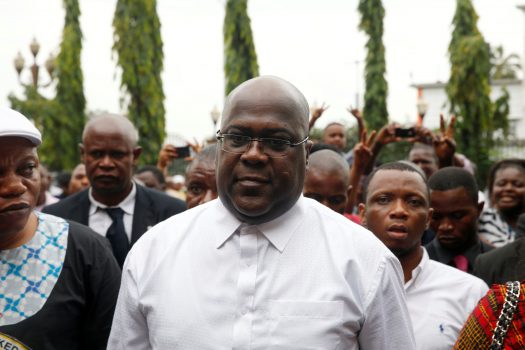 The French and Belgian governments have expressed shock over Thursday’s declaration of opposition candidate, Felix Antoine Tshisekedi Tshilombo as the president-elect of the Democratic Republic of Congo (DRC).
The French and Belgian governments have expressed shock over Thursday’s declaration of opposition candidate, Felix Antoine Tshisekedi Tshilombo as the president-elect of the Democratic Republic of Congo (DRC).
The 56-year-old Felix, son of Etienne Tshisekedi, a deceased opposition veteran was declared winner of the keenly contested December 10, 2018 presidential election by the country’s electoral board, Commission Electorale Nationale Indépendante (CENI).
Tshisekedi is expected to take over from outgoing president, Joseph Kabila in what will become the first peaceful transition of power in the troubled central African country.
The provisional results released by CENI showed that Tshisekedi got over seven million votes representing over 38% of valid votes cast to beat another opposition leader, Martin Fayulu who got 34.83% of the votes. The ruling Coalition’s candidate and former Interior Minister, Emmanuel Ramazani Shadary came in third with 23.84% of cast votes.
Reacting to the presidential polls results, the French Foreign Minister, Jean-Yves Le Drian called for clarity on the shocking election results, saying the surprise victory of Tshisekedi was at odds with what was seen on the ground.
“We must have clarity on these results which are the opposite to what we expected. The Catholic Church of Congo did its tally and announced completely different results,” Le Drian told reporters.
His Belgian counterpart, Mr. Didier Reynders also expressed a similar view, saying: “We have some doubts that we need to check and which will be debated in the coming days in the Security Council,” Reynders told the Belgian national broadcaster, RTBF.
A fellow opposition candidate, Martin Fayulu has however rejected the results of the election, asking the Catholic Church, the regional SADC observer mission and the African Union to release their result tallies from the vote.
This is even as reports say protests have erupted in Fayulu’s strongholds as his supporters have insisted that he was the duly elected candidate.
However, the United Nations has commended the Congolese people for the peaceful conduct of the polls, urging all stakeholders to refrain from violence and channel any disputes arising from the election to the concerned authorities.
“The Secretary-General takes note of the announcement made by the Commission Electorale Nationale Indépendante (CENI) of the provisional results of the 30 December presidential elections in the Democratic Republic of the Congo (DRC).
“He commends the Congolese people and political actors for the conduct of the presidential, national and provincial legislative elections, which saw a broad and inclusive participation of political parties.
“The Secretary-General calls on all stakeholders to refrain from violence and to channel any eventual electoral disputes through the established institutional mechanisms in line with the Democratic Republic of the Congo’s Constitution and relevant electoral laws.
“The Secretary-General expresses the hope that the CENI, the Constitutional Court, the Government, political parties and civil society will each live up to their responsibility in preserving stability and upholding democratic practices in the Democratic Republic of the Congo.
“The Secretary-General further reiterates the continued support and commitment of the United Nations, in collaboration with regional actors and international partners, for the consolidation of peace, stability and development in the Democratic Republic of the Congo,” the UN statement read.
In his post election victory speech in Kinshasa, the country’s capital, Tshisekedi paid glowing tributes to outgoing President Kabila, promising to be a President to all Congolese.
Tshisekedi said: “First of all I wish to thank God, the master of time and circumstances who allowed for such an event which a few weeks ago was still unimaginable.
“That is why I follow it directly and I know many of you find it hard to accept – but I say it with sincerity, I pay homage to President Joseph Kabila, President of the Republic.
“Today, we must no longer consider each other as adversaries but rather as partners in democratic change in our country.”

Israel’s European Allies Urge Restraint Amid Escalating Tensions With Iran
Israel Prepares For Possible Attack From Iran As Tensions Escalate
Senegal’s New President Names Ousmane Sonko As Prime Minister
Israeli Air Raid Claims Lives Of International Aid Workers And Palestinian Driver